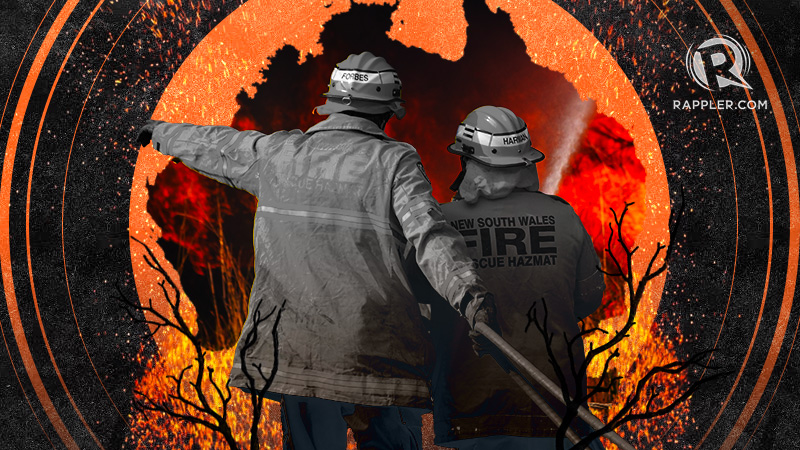

As many have commented, it appears that 2020 is fast becoming a year of disasters. Not yet fully into the first month and the world is already touched by earthquakes, volcanic eruptions, fires, floods, hailstorms, dust storms, a locust infestation, water turning red, an epidemic, potential wars, air crashes, and extreme weather conditions. In fact, just before the previous year ended, Australia began to experience the worst bushfires it has seen in decades burning across almost half its territory. This piece examines Australians’ insights into the bushfires, the fires’ impact on Australian daily life, and lessons that continue to be learned from the recurrent infernos.
Bushfires in Australia are nothing new. That the recent fires have been intense and widespread caught the attention of the world, and so the unfamiliar thought they were something unusual. But they are not. Bushfires regularly occur especially during the summer months (Dec-Feb) from intense dry heat sweeping across the land. Traditional indigenous burning may also trigger fires. And many now believe that climate change has been exacerbating the problem.
The recent bushfires, which impacted mostly the eastern half of the island continent, burned some 18.6 million hectares (46 million acres/186,000 square kilometers/72,000 square miles) of land, destroyed 5,900 buildings (including approximately 2,683 homes), killed at least 33 people, and annihilated an estimated 1 billion animals driving some endangered species into extinction. As local authorities put it: "The nation’s loss is huge and beyond imagination!"
As of this writing, the bushfires have waned and disaster response is currently moving towards recovery, an equally daunting challenge which will take a long period of time to complete given the magnitude of lives and property impacted. The local councils have been and are the key not only in disaster response but in the long road to bushfire recovery. "Response towards saving lives and property and minimizing impacts on infrastructure and the environment has been heroic," reported The West Australian.
As in other places, Australians are quite divided on how to effectively deal with the recurrent bushfires even as they are united toward disaster prevention to the extent possible or mitigating disaster impact. Such division can be gleaned from the diverse reactions of individuals and groups across Australian society.
For one, the strategists point out that there has not been enough collaboration between government and the private sector, rendering the attainment of climate change targets unfulfilled beyond commitment rhetoric. Even before the bushfires, a late 2019 survey of business CEOs in Australia revealed that two-thirds of them viewed climate change as a major threat. The recent bushfires have cemented their view. The global CEO survey released by audit firm PwC admitted that both economic and revenue growths are major hurdles for 2020 and probably years to come due to climate change. Government’s commitment to the Paris Accord is a 26%-28% carbon emissions reduction by 2030 from the 2005 level.
"The cost of inaction on climate change was clear in the bushfire relief package that had to be rolled out by Federal Government," said opposition Labor Leader Anthony Albanese.
It must be understood that corporate growth translates into employee livelihood and benefit revenues as well as tax revenues that propel disaster response and recovery. For instance, a local councilor reported that recovery is "cemented by a federal grant of $1M to bushfire affected councils with minimal red tape." That is why government is also keen on reversing the past six-year deficit spending into a budget surplus.
Meanwhile, there are also some members of society who are not fully convinced that climate change is a major threat exacerbating the bushfires. These locals would rather see the country improving on prevention strategies. Hugh Francis of Portland, Victoria wrote that Prime Minister Scott Morrison should not be influenced by the Greens, Labor, climate activists, and some media claiming that the latest bushfires and floods in the east coast are the results of climate change. He proposes instead that state and territory governments become realistic about hazard reduction. Moreover, Doug Hurst from Chapman, ACT added that man cannot control the complexities of climate whereby carbon dioxide is merely one minor part, insinuating that carbon emissions control is useless and a waste. Furthermore, John Bell (Heidelberg, Victoria) blasts climate change believers, accusing them of ideological opportunism in "deliberately ignoring the data of worse fire disasters down through history."
On the other hand, Marianne Cannon of Brisbane, Queensland supports the view that "climate change is well known as a risk multiplier for extreme weather, bushfires, and drought," and that "the fires have woken many up to the harsh reality that is global climate change."
The Aboriginal people of Australia also had something to say about the bushfires. In fact, the fires gave them another opportunity to air their grievances against government attributing climate change to how their ex-colonizers have mistreated the land. Professor Alexis Wright, a member of the Waanyi nation, wrote in the New York Times that "the best way to combat these destructive fires is to listen to those who have cared for the land the longest."
Expanding understanding of the bushfires as a global threat, Wright adds that "in Australia, as well as in the Amazon rainforest, the Congo, and Northern California, blatant disregard for indigenous land management practices has contributed to the burning of the forests, the destruction of indigenous culture, and the deaths of many people and animals."
Australians have weathered the different natural calamities that had come their way through the years, bushfires included. As in every disaster that impacts any human habitat, the loss in life and property is always devastating. How much more if the magnitude of the disaster is as widespread and prolonged as the recent bushfires? Lives are interrupted, halted, and even ended.
Fortunately, general response has been heroic with almost all sectors coming together to help led by the affected local councils. Many have volunteered to keep the fires at bay, thereby even risking their lives. Donations in cash and in kind have been pouring in from domestic and foreign donors. For instance, I am aware of donations and service support from the Business Council of Australia, Red Cross, Postal Service, cultural workers, and the Catholic Church, among many others. Fund raisings by just about anyone who can (e.g. Jetty’s Bar & Grill in South Yunderup, etc.) has not been uncommon.
Vivek of Australia Post, who helped the Victoria State Emergency Service evacuate people and deliver critical supplies, had this to say: "What really struck me was the resilience of the people who have banded together from all parts of life to help rebuild a fractured landscape. There is such positivity in the face of a national tragedy." Volunteer firefighter Max added: "We see so many people who have lost everything and we wonder how they’re going to move forward. They will need a lot of help. But we also see many people already helping each other and that’s very important. It doesn’t matter how much or little you do — it’s about being there for one another."
The next phase in this tragic journey is the long road to recovery. In this regard, local governments through the councils of affected communities will continue to spearhead recovery efforts as they had with disaster response. According to The West Australian, not only are the councils mandated, but that they are most familiar with the identities and needs of their constituencies. Recovery efforts are mammoth as they deal with almost every aspect of people’s lives and may take months or even years to manage through. The council staff themselves are already exhausted at this point, as many are victims themselves, have been battling the blazes as well, supporting emergency response agencies, and operating emergency relief centers on top of their day-to-day local government services.
Local, State, and Federal governments will need to work together to rebuild entire communities ravaged by fires. The Prime Minister and the Federal Disaster and Emergency Management Minister have recognized the role played by the councils towards leading local communities along the road to recovery. By all accounts, resilience is already quite apparent if the initial actions from both the victims and all those helping them are indicators.
Finally, what are the lessons learned moving forward?
First, Australians have already agreed that controlling carbon gas emissions is a commitment towards mitigating widespread bushfire risk. They are just divided on how to achieve commitment targets. Labor government promised a 45% cut in emissions on 2005 levels by year 2030 as well as a budget surplus to reverse the past straight six-year deficit. But it will have to increase taxes to do so.
On the other hand, PM Morrison is willing to spend for climate change related initiatives but not demand new taxes. His challenge: emissions reduction without increasing taxes via carbon tax, without higher electricity costs, and without wiping out important sectors of the economy depended upon by the nation.
Secondly, a more effective collaboration between government and the private sector towards achieving committed emission reduction targets must be attained. The lack of effective collaboration between the two entities unlike those found in other countries has been acknowledged as a major flaw. The recent fires have cemented urgency to this needed reform.
Thirdly, Australia may need to review its current disaster management policy given the now greater impact of bushfires and the near impossibility of stopping them and their spread once underway.
And fourth, now may be the right time for Australia to finally allow substantive contribution from its first settlers — the Aboriginal people — regarding an issue that lies at the heart of still aggrieved native Australians — land. As Wright pointed out, "Australia’s leaders need to recognize the depth and value of Aboriginal knowledge and incorporate (those) skills in hazard management." More specifically, he proposes a national indigenous burning program wherein indigenous people lead land and hazard management in the country. – Rappler.com
Col Dencio Acop (Ret), PhD, CPP, AMBCI is a West Point graduate (1983) who had served with the Armed Forces of the Philippines. He lived in Australia for a year when he completed a masters degree at the University of New South Wales. Today, he frequents the continent on personal visits.